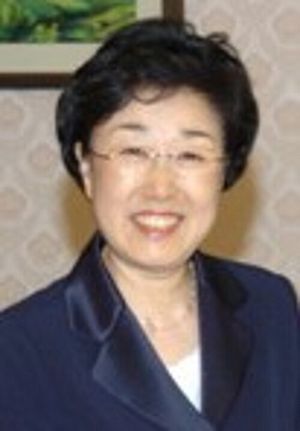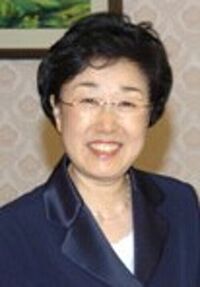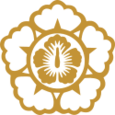Han Myeong-sook facts for kids
Quick facts for kids
Han Myeong-sook
|
|
|---|---|
| 한명숙 | |

Han in 2006
|
|
| Chairperson of the Democratic United Party | |
| In office 16 January 2012 – 12 April 2012 |
|
| Preceded by | Won Hye-young Lee Yong-sun (acting) |
| Succeeded by | Moon Sung-keun |
| Prime Minister of South Korea | |
| In office 19 April 2006 – 7 March 2007 |
|
| President | Roh Moo-hyun |
| Preceded by | Lee Hae-chan Han Duck-soo (acting) |
| Succeeded by | Kwon O-kyu (acting) Han Duck-soo |
| Minister of Environment | |
| In office 27 February 2003 – 16 February 2004 |
|
| Prime Minister | Goh Kun |
| Preceded by | Kim Myung-ja |
| Succeeded by | Kwak Kyul-ho |
| Minister of Gender Equality | |
| In office 29 January 2001 – 26 February 2003 |
|
| Prime Minister | Lee Han-dong Chang Sang (acting) Jeon Yun-churl (acting) Chang Dae-hwan (acting) Kim Suk-soo |
| Preceded by | Position established |
| Succeeded by | Ji Eun-hee |
| Personal details | |
| Born | 24 March 1944 Heijō, Korea, Empire of Japan |
| Political party | National Congress for New Politics (Before 2000) Millennium Democratic Party (2000–2003) Uri Party (2003–2007) United New Democratic Party (2007–2008) Democratic Party (2008–2011) Democratic United Party (2011–2014) Minjoo Party (2014–2015) Independent(2015–present) |
| Spouse | Park Seong-jun |
| Alma mater | Ewha Womans University |
| Signature |  |
| Korean name | |
| Hangul |
한명숙
|
| Hanja |
韓明淑
|
| RR | Han Myeongsuk |
| MR | Han Myŏngsuk |
| Korean royal family (Cheongju Han clan) |
|
Han Myeong-sook (Korean: 한명숙; born March 24, 1944) is an important South Korean politician. She made history as the first woman to serve as the Prime Minister of South Korea. She held this high position from 2006 to 2007.
Han Myeong-sook was born in what is now Pyongyang. She studied French literature at Ewha Womans University in Seoul. Her career has included many important roles in the South Korean government.
Contents
Han Myeong-sook's Early Career
Han Myeong-sook began her journey in public service long ago. In the late 1970s, she was wrongly imprisoned for her work to bring democracy to South Korea. A government committee later cleared her name in 2001. They confirmed that her confession was forced.
In 1999, she officially entered politics. She joined the National Congress for New Politics. The next year, in 2000, she was elected to the National Assembly. This is like being a member of parliament.
Serving as a Minister
Han Myeong-sook held two important minister positions before becoming Prime Minister.
- From 2001 to 2003, she was the first Minister of Gender Equality. This role focused on making sure men and women had equal opportunities.
- From 2003 to 2004, she served as the Minister of Environment. In this job, she worked on protecting South Korea's natural world.
Becoming Prime Minister
On March 24, 2006, President Roh Moo-hyun chose Han Myeong-sook to be the next Prime Minister. This was a very big moment for South Korea. She became the first woman to ever hold this top government job.
On April 20, 2006, Han Myeong-sook officially took her oath. She started her term as Prime Minister of South Korea.
 |
|
|
Premiership of Han Myeong-sook
|
|
|---|---|
| April 19, 2006 – March 7, 2007 | |
| President | Roh Moo-hyun |
| Cabinet | Full list |
| Party | Uri |
| Seat | Sejong City |
|
← Lee Hae-chan • Han Duck-soo (1st) →
|
|
 |
|
International Visits as Prime Minister
As Prime Minister, Han Myeong-sook traveled to other countries. These trips helped strengthen South Korea's relationships with other nations.
- In September 2006, she visited Libya.
- She also went to the United Arab Emirates in September 2006. There, she talked with Prime Minister Mohammed bin Rashid Al Maktoum. They discussed ways to improve trade and cooperation between their countries.
- Later that month, she met with Daniyal Akhmetov, the Prime Minister of Kazakhstan. They signed agreements to boost economic ties. South Korea agreed to invest more in energy and other projects there.
- Her travels also took her to Uzbekistan. She met with Prime Minister Shavkat Mirziyoyev in September 2006. They signed deals, including one for Uzbekistan to send uranium ore to South Korea.
Resignation from Office
Han Myeong-sook resigned as Prime Minister on March 7, 2007. She considered running for president in the upcoming elections.
After Being Prime Minister
After her time as Prime Minister, Han Myeong-sook continued to be active in politics.
- In 2007, she sought her party's nomination for president but was not chosen.
- In 2008, she ran for re-election to parliament but was not successful.
- In 2010, she ran for Mayor of Seoul. She lost by a very small number of votes.
In January 2012, Han Myeong-sook was elected as the leader of the Democratic United Party (DUP). This party was a major opposition group in South Korea. She was elected to parliament again in April 2012. However, her party did not win the general election. She then stepped down as the DUP leader in April 2012. For a few months, both major Korean parties were led by women: Park Geun-hye and Han Myeong-sook.
In August 2015, Han Myeong-sook faced some legal issues. She was later granted special forgiveness by the government in 2021. This meant her rights were fully restored.
 | Sharif Bey |
 | Hale Woodruff |
 | Richmond Barthé |
 | Purvis Young |

